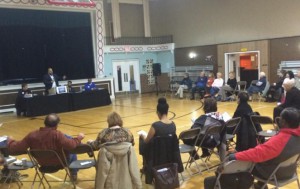. . DEMOCRATIC PARTICIPATION . .
An article by Megan Pauly for Delaware Public Media
A community discussion Saturday hosted Wilmington’s Movement for a Culture of Peace focused on finding ways to deal with issues such as trauma that violent crime in the city is bringing into classrooms. Around 30 educators, activists and concerned community members participated in the event. Among them was Malik Muhammad, president of a restorative practices consulting group, Akoben, LLC. He says stressing connectedness and building positive relationships helps change behavior, not punishment.

Photo by Megan Pauly / Delaware Public Media
“The traditional approach to trauma has been one, individualized. So we’ve isolated those who’ve experienced trauma and attempted to deal with them on an individual basis,” Muhammad said. “That approach in and of itself isn’t necessarily a negative one, but we need to create environments of safety, connection, trust and bonding so that those who are facing trauma – whether it’s seen or unseen – are really feeling connected.”
Muhammad adds relying mostly on social workers and counselors to engage the students isn’t effective. He says teachers, administrators and even students themselves need to be involved.
In 2012, the state brought Muhammad’s organization in to hold four full-day workshops for around 145 education professionals. Since then, he’s worked with 16 of 19 Delaware school districts, tailoring workshops to their specific needs.
(article continued in right column)
Restorative justice, What does it look like in practice?
(article continued from left column)
Will Fuller, Principal at the Positive CHANGE Academy – the Red Clay School District’s alternative school – was initially skeptical of the broad “relationship building” concept, but has seen firsthand its positive effects.
“I thought hey, this is not going to work for our kids but what I noticed over the last two years is that the students really love the process. They’ve bought into the process, the culture has changed,” Fuller said. “The staff members have bought into the process; it hadn’t been overnight.”
Kelley Lumpkin, Success Interventionist at Baltz Elementary in Elsmere, says she’s also seen a positive shift in the school’s culture since these practices were implemented a few years ago.
But Lumpkin says she sees social media as a potential barrier to creating critical face-to-face connectedness.
“It’s not like the schoolyard where these arguments used to happen and they could see the effect, right there. And it might give them a cue to stop it,” Lumpkin said. “Now they’re doing it where they’re not even seeing the effect, they’re not seeing what happens to the child as they’re doing it and other kids tagging in. And then the come to school and the rumor mill has spread it to another 20 kids.”
Lumpkin says her approach to working with kids varies depending on the situation.
It could include a group discussion for 10-15 minutes, or an hour-long talk. For other school-wide issues, she’s even held them in the gym for the entire 5th grade.
Muhammad says his work in Delaware has largely been in New Castle and Kent counties. This year, he’s working with the Red Clay and Christiana school districts.